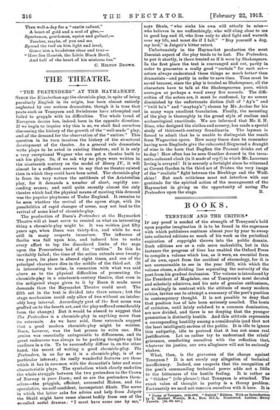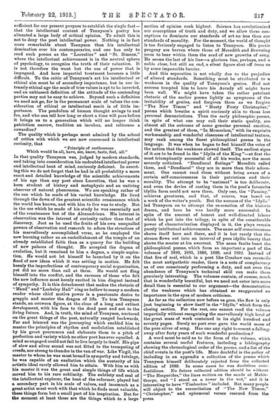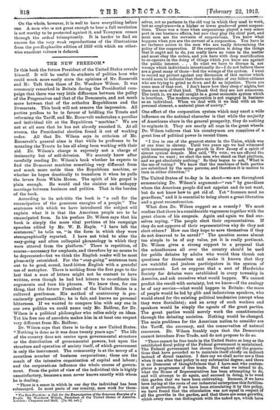BOOKS.
TENNYSON AND THE CRITICS.* IF any proof is needed of the strength of Tennyson's hold upon popular imagination it is to be found in the eagerness with which publishers continue almost year by year to sweep into collected editions so much of his work as the periodical expiration of copyright throws into the public domain. Such editions are as a rule mere makeshifts, but in this instance the progress of time has enabled the Oxford Press to compile a volume which has, as it were, an essential form of its own, apart from the accident of chronology, for it is not unreasonable to see in the year 1870, with which the volume closes, a .dividing line separating the maturity of the poet from his gradual declension. The volume is introduced by the President of Magdalen, one of Tennyson's most devoted and scholarly admirers, and his note of genuine enthusiasm, so strikingly in contrast with the attitude of many modern critics, invites one to attempt a summary of the poet's position in contemporary thought. It is not possible to deny that that position has of late been seriously assailed. The hosts of criticism, until lately subdued to a common domination, are now divided, and there is no denying that the younger generation is distinctly hostile. And this attitude represents a corresponding hostility among a considerable (and that not the least intelligent) section of the public. It is idle to ignore this antipathy, idle to pretend that it has not some real justification. Let us rather try to understand the rebels' grievance, comforting ourselves with the reflection that, whatever its justice, our own allegiance will not be seriously shaken.
What, then, is the gravamen of the charge against Tennyson ? It is not surely any allegation of technical insufficiency. Indeed, one suspects that the recognition of the poet's commanding technical power adds not a little to the bitterness of the hostile feeling. It is rather as a " thinker " (vile phrase!) that Tennyson is attacked. The exact value of thought in poetry is a thorny problem. Fortunately we need not concern ourselves with it here. It is
* Poems of Tennyson, 1850.1870. " Oxford" Edition. With an Introduction by T. Herbert Warren, M.A., Hon. D.C.L. 11:ustrated. London : Henry Frowde. Los. ea. net.]
sufficient for our present purpose to establish the single fact— that the intellectual content of Tennyson's poetry has alienated a large body of critical opinion. To admit this is not to deny the poet intellectual power. Nothing is in fact more remarkable about Tennyson than his intellectual domination over his contemporaries, and one has only to read such poems as the "Lucretius" and " St. Simeon," where the intellectual achievement is in the neutral sphere of psychology, to recognize the truth of their valuation. It is not therefore the want but the use of power that is impugned. And here impartial treatment becomes a little difficult. To the critic of Tennyson's art his intellectual or ethical aim must be of secondary importance, but in our in- tensely ethical age the scale of true values is apt to be inverted, and an unbiassed definition of the attitude of the contending parties may not be easy to achieve. Beyond such a definition we need not go, for in the permanent scale of values the con- sideration of ethical or intellectual merit is of little im- portance. The pendulum of human thought swings to and fro, and who can tell how long or short a time will pass before it brings us to a generation which will no longer think patriotism narrow, tradition an incubus, and reticence a cowardice P The quality which is perhaps most admired by the school of critics with which we are now concerned is intellectual curiosity, that "Principle of restlessness Which would be all, have, see, know, taste, feel, all."
In that quality Tennyson was, judged by modern standards, and taking into consideration his undoubted intellectual power and intellectual bent of mind, curiously deficient. In assert- ing this we do not forget that he had in all probability a more exact and detailed knowledge of the scientific achievements of his age than any poet since Lucretius, that he was a keen student of history and metaphysic and an untiring observer of natural phenomena. We are speaking rather of the use which he made of his varied knowledge. He lived through the dawn of the greatest scientific renaissance which the world has known, and with him to live was to study. But in the use which he made of his study he was essentially not of the renaissance but of the Alexandrians. His interest in observation was the interest of curiosity rather than that of discovery. Just as he used the fruits of his own unequalled powers of observation and research to adorn the structure of his marvellously accomplished verse, so he employed the new learning rather as an embellishment of the temple of an already established faith than as a quarry for the building of new palaces of thought. He accepted the dogma of evolution, but it remained to him a dogma, a simple aspira- tion. He would not let himself be launched by it on the flood of new ideas which it was setting in motion. He felt keenly the imperfections of contemporary social organization, yet did no more than rail at them. He would not fling himself into the conflict, and the excesses of those who felt the new influence most keenly excited in him disgust instead of sympathy. It is this detachment that makes the rhetoric of "Maud" and "Locksley Hall" ring so hollow to many a modern reader whose chief motive power is a passionate desire to grapple and master the dragon of life. To him Tennyson stands, an outworn figure, at the close of a long and extinct development, with his face to the dead past and not to the living future. And, in truth, the mind of Tennyson, nurtured on the great things of the past, naturally ranged backwards, Far and leisured was the journeying which enabled him to master the principles of rhythm and modulation established by his great precursors and elaborate them to a pitch of perfection and variety which no other poet has ever eqnalled. A.
mind so engaged could not fail to live largely to itself. His pipe of slow and silver sound was not fitted to the trumpeting of creeds, nor strong to thunder in the van of war. Like Virgil, the master to whom he was most bound in sympathy and tutelage, he was capable of an exaltation which the austerity of his artistic ideal rarely allowed him to attain. With him as with
his master it was the great and simple things of life which moved him to his rare sublimity. The subtlety and zeal of
the intellectual explorer, the heat of the reformer, played but a secondary part in his scale of values, and inasmuch as a great artist must work with that which he finds most valuable,
these things form but a small part of his inspiration. But for the moment at least these are the things which to a large
section of opinion rank highest. Science has revolutionized our conceptions of truth and duty, and we allow these con- ceptions to dominate our standards of art no less than our standards of morality. For the moment, the world of thought is too furiously engaged to listen to Tennyson. His poetic progeny are barren where those of Meredith and Browning seem to bear within them the seed of new growths of song. He seems the last of his line—a glorious line, perhaps, and a noble close, but still an end, a silent figure shut off from us by some impassable barrier.
And this separation is not wholly due to the prejudice of altered standards. Something must be attributed to a
weakness in the quality of Tennyson's genius. Had not success tempted him to leave his Arcady all might have been well. We might have taken the rather petulant rhetoric of the earlier poems lightly as symptoms of the irritability of genius, and forgiven them as we forgive "The New Timon" and "Musty Fusty Christopher," poems which breathe a spirit curiously akin to those less personal denunciations. Then the early philosophic poems, in spite of what one may call their statics quality, are
almost all the outcome of some genuine personal emotion,
and the greatest of them, "In Memoriam," with its exquisite workmanship and wonderful closeness of intellectual texture, may rank among the finest philosophical poems in the language. It was when he began to feel himself the voice of the nation that the weakness showed itself. The earliest signs of it are to be found in the "Idylls of the King "—at first the most triumphantly successful of all his works, now the most severely criticized. "Dandiacal flutings" Meredith called them, and "Dandiacal" they are in more than their adorn- ment. One cannot read them without being aware of a certain self-consciousness in their patriotism and their morality. The attempt to be "national" is too deliberate, and even the device of casting them in the poet's favourite idyllic form could not save them. Only one, the "Passing," achieves greatness, and that, of course, was based on a work of the writer's youth. But the success of the "Idylls" led Tennyson on to attempt the re-creation of the historic, drama, and here be was hardly more successful. In spite of the amount of honest and well-directed labour which he put into the trilogy, in spite of the considerable power of characterization displayed in it, the plays remain purely intellectual achievements. The same self-consciousness shows itself here and there, and it is but rarely that the stream flows out into an interval of pure idyllic beauty that shows the master at his sweetest. The same faults beset the philosophical poems, which form so important a part of the volumes of 1880, 1885, 1886, 1889, and 1892. Instead of
that fire of zeal, which in a poet like Crashaw can reconcile the most antipathetic reader, there is a note of complacency as of one consciously performing a duty, and not even the abundance of Tennyson's technical skill can make them genuinely interesting. The volumes contain, of course, much that is wonderfully beautiful, but we need not enter into more detail than is essential to our argument—the demonstration of the weakness which has obtained so exaggerated an importance in the eyes of modern criticism.
As far as the collection now before us goes, the flaw is only just beginning to show itself in the "Idylls," which form the closing section. For the rest, one cannot read the volume impartially without recognizing the marvellously high level of the great mass of work contained in its eight hundred and
seventy pages. Surely no poet ever gave the world more of the pure silver of song. Has one any right to resent a falling- away after forty years of such wonderful production ?
A word must be said as to the form of the volume, which contains several useful features, including a bibliography showing the chronological order of the poems, and a list of the
chief events in the poet's life. More doubtful is the policy of including in an appendix a collection of the poems which Tennyson himself deliberately rejected from the collected
edition of 1889. In some cases he was doubtless over- fastidious. No future collected edition should be without
"The Hesperides," the lines written on the sands at Mable-
thorpe, and "I stood on a tower in the wet," and it is interesting to have " Timbuctoo " included. But many people will object to the resuscitation of " The New Tinton," " Christopher," and ephemeral verses rescued from the press.
On the whole, however, it is well to have everything before one. A man who is not great enough to bear a full revelation is not worthy to be protected against it, and Tennyson comes through the ordeal triumphantly. It is harder to find an excuse for the very weak reproductions of the illustrations from the pre-Raphaelite edition of 1859 with which an other- wise excellent volume is defaced.
















































 Previous page
Previous page